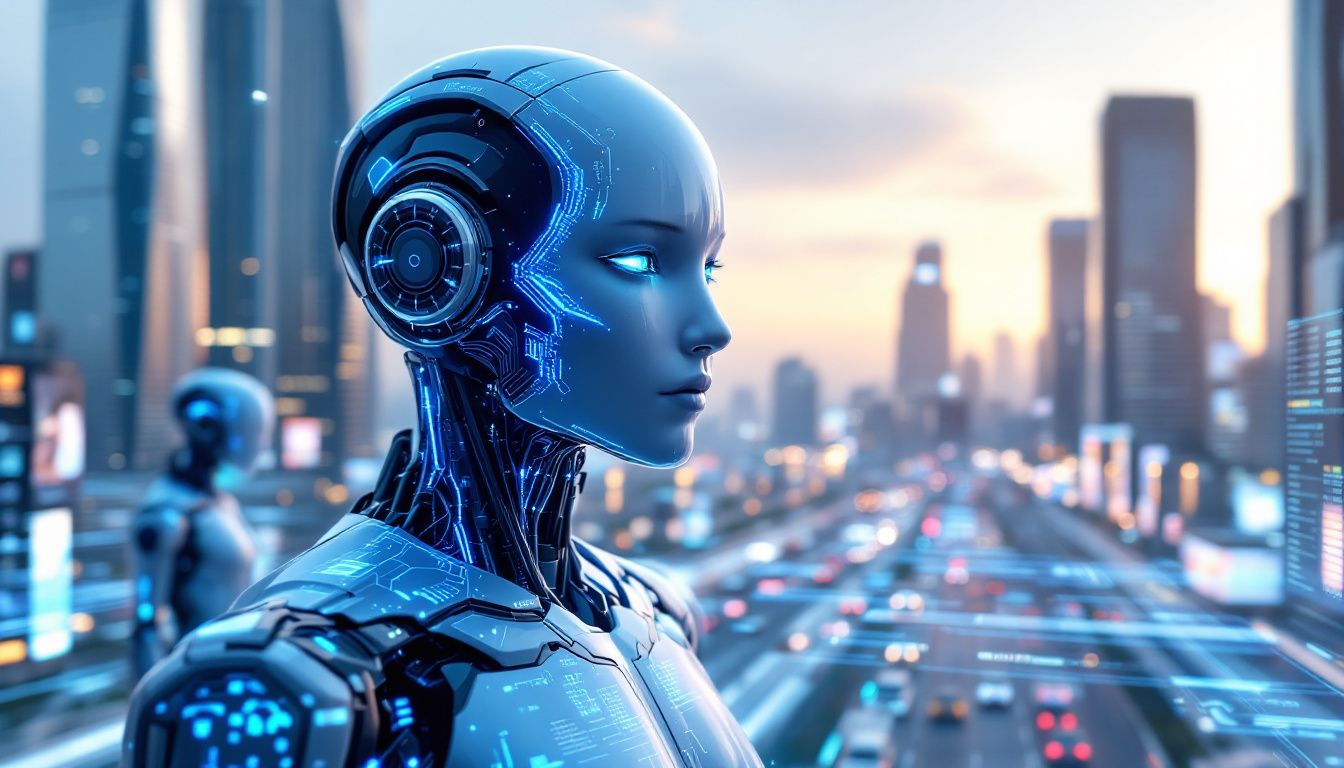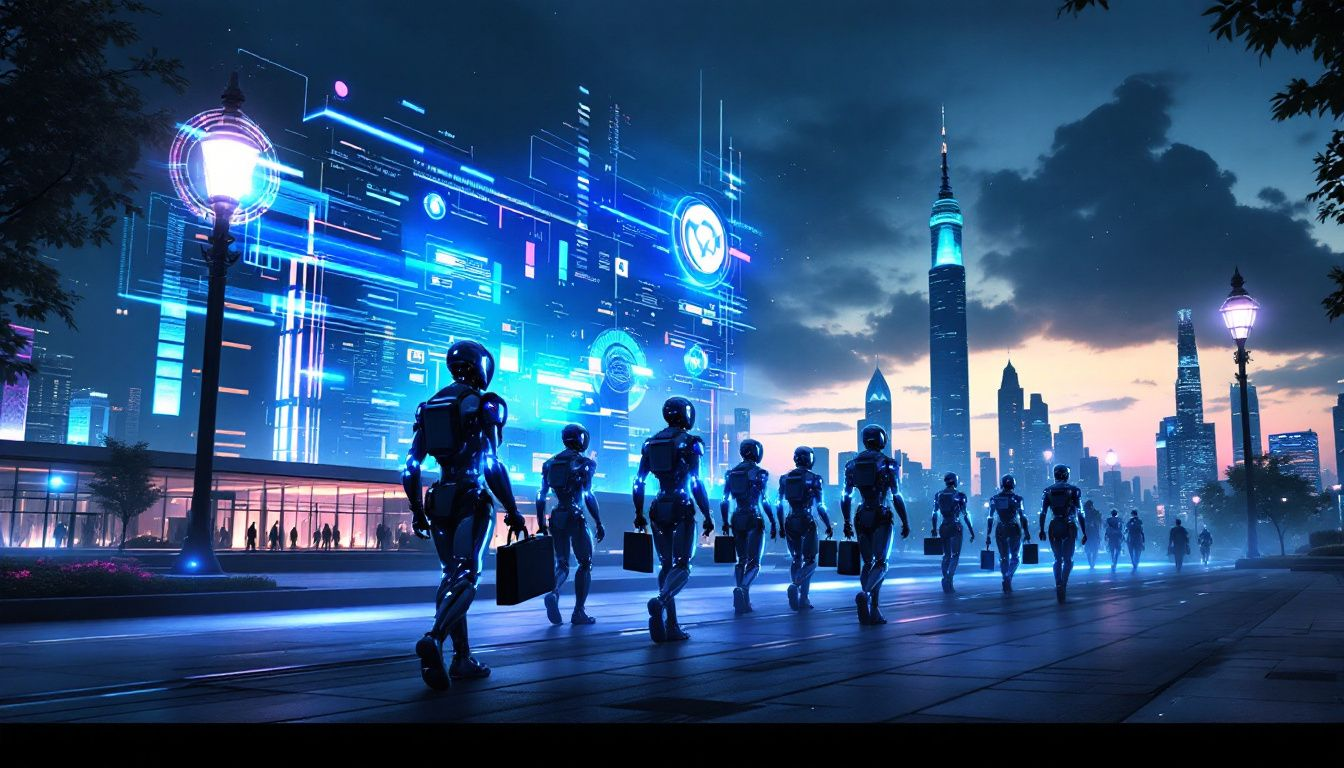AI Agent: Revolutionize Your Customer Service with Artificial Intelligence

AI Agent: Revolutionize Your Customer Service with Artificial Intelligence
What is an AI agent and how can it transform your customer service? An AI agent, or artificial intelligence agent, is an advanced technology that can automate and personalize customer interactions. AI agents are capable of optimizing business processes and improving logistics, making them essential for transforming customer service. Unlike traditional chatbots, AI agents not only respond to queries but also anticipate customer needs, offering a more seamless and human experience. In this article, we'll explore what an AI agent can do and how it can revolutionize your customer service.
Key Points
Artificial intelligence agents outperform traditional chatbots by automating up to 85% of tasks in call centers, thus improving operational efficiency.
These agents are proactive and capable of personalizing interactions, adapting their responses based on customer needs through their advanced natural language understanding. They can also guide customers to specific articles, whether products or services, precisely meeting their needs.
Integrating AI agents into businesses not only improves customer experience but also achieves significant cost savings while increasing productivity.
AI Agent: Revolutionize Your Customer Service with Artificial Intelligence

Artificial intelligence (AI) agents represent a significant advancement over traditional chatbots. Unlike the latter, which mainly interact with humans, AI agents execute tasks autonomously, significantly improving operational efficiency. For example, in call centers, AI agents can automate up to 85% of certain tasks, freeing up valuable resources and reducing operating costs.
Text with the incorporated word: Before writing an article, it is essential to properly structure your ideas.
These agents are not just reactive; they are also proactive. They can adapt their responses to specific customer needs, detect user sentiments and needs, and offer personalized solutions in real-time. Moreover, they possess advanced natural language understanding, allowing them to interact more intuitively and humanely. For example, Zendesk's AI agents are capable of providing accurate and quick assistance even for complex questions.
After:
These agents are not just reactive; they are also proactive. Here are some of their capabilities:
-
Adapting their responses to specific customer needs
-
Detecting user sentiments and needs
-
Offering personalized solutions in real-time
-
Possessing advanced natural language understanding, allowing them to interact more intuitively and humanely
For example, Zendesk's AI agents are capable of providing accurate and quick assistance even for complex questions.
The integration of AI agents in businesses not only promotes innovation but also helps maintain market competitiveness. Using tools like Botpress, companies can create customized AI agents that exactly meet their specific needs. An integrated platform is essential for developing, testing, and deploying AI applications, facilitating performance evaluation and optimization of applications in production environments.
Ultimately, adopting these technologies not only improves customer experience but also achieves substantial cost savings while increasing service accuracy.
Introduction
Artificial intelligence (AI) agents are designed to empower customer problem resolution, ranging from simple queries to more complex issues. Unlike traditional chatbots, they offer a more human and personalized interaction thanks to their ability to understand and respond to customers' natural language. This technological advancement allows businesses to surpass the limitations of previous tools and provide high-quality user experience.
Studies show that the majority of organizations believe that generative AI can make digital interactions more human. Thanks to this capability, AI agents not only respond to immediate customer needs but also anticipate their future requests, creating a smooth and efficient customer experience.
By integrating these agents into their operations, businesses can transform their services, improve customer satisfaction, and promote innovation.
Defining an Artificial Intelligence Agent
What exactly is an artificial intelligence agent? AI agents are autonomous entities capable of understanding natural language and accomplishing tasks independently. Unlike traditional chatbots, these agents are reactive and proactive, allowing them to effectively respond to user needs in real-time. For example, Zendesk's AI agents have high autonomy, enabling them to handle complex questions and provide quick and accurate assistance.
Callbots, a specific form of AI agents, can automate up to 85% of certain tasks in call centers, thus increasing customer service efficiency. AI agents distinguish themselves from traditional chatbots through their ability to offer a more human service, understanding customer questions and feelings to react appropriately. This ability to automatically recognize the intention behind a customer's question and detect customer needs and feelings significantly improves the customer experience.
Artificial intelligence promotes innovation in businesses, allowing them to maintain a competitive position in the market. Using AI agents can lead to significant savings and improved efficiency in the short term. Finally, these agents can adapt through feedback loops, making better decisions based on collected data.
Components of an Artificial Intelligence Agent
An artificial intelligence agent is a complex system composed of several key elements. These components work together to enable the AI agent to perceive its environment, make decisions, and act accordingly. Understanding these components is essential to appreciate the functioning and capabilities of artificial intelligence agents.
Agent Function
The agent function is the heart of an artificial intelligence agent. It defines how the agent maps the data it has collected to the actions it takes. In other words, the agent function is responsible for decision-making and planning the agent's actions. Through sophisticated algorithms, this function allows the agent to choose the best actions to take based on available information, thus optimizing results for the user.
Percepts and Actuator
Percepts are the sensory inputs that the AI agent receives from its environment. They provide information about the current state of the observable environment in which the agent operates. For example, in the case of a virtual assistant, percepts may include voice commands or textual data. The actuator, meanwhile, is the mechanism that allows the AI agent to physically interact with its environment. Actuators can be motors, pumps, valves, or even software interfaces that allow the agent to respond to user requests.
How AI Agents Work
Artificial intelligence agents use machine learning algorithms to analyze data and perform cognitive tasks. They are capable of adapting to changing situations by perceiving and interpreting information from their environment. This adaptability is enhanced by the use of long-term memory, which allows agents to maintain context and improve their decision-making over time.
AI agents interact in natural language, which facilitates communication with users. They can work autonomously by making decisions based on data inputs and acquired knowledge. For example, they can plan actions based on defined objectives and collected information, allowing them to optimally respond to customer needs.
Intelligent agent models, called Large Action Models (LAM), are emerging to improve agents' ability to make autonomous decisions. AI systems are developing to automate complex task sequences, going beyond data analysis and generation. These agents can execute physical or digital actions to achieve desired outcomes, thus offering a complete solution for various business applications.
Types of Artificial Intelligence Agents

Artificial intelligence agents are mainly classified into three types: simple reflex agents, learning agents, and utility-based agents. Advanced systems often combine several types of agents to function effectively, and a future trend is the development of cooperative intelligences, capable of working together for complex tasks.
Simple Reflex Agents
Simple reflex agents act according to predefined instructions. They are particularly effective in predictable environments, as they can react quickly without requiring complex thinking.
These agents rely on condition-action rules to execute specific tasks.
Learning Agents
Learning agents are capable of adapting their behavior through continuous analysis of data and past experiences. They are often used for tasks that require flexibility and ability to adapt to changes.
Utility-Based Agents
Utility-based agents make decisions based on the expected utility of each action. They evaluate possible actions based on expected utility, making them particularly effective for decision-making in complex environments.
Practical Applications of AI Agents in Business

The integration of artificial intelligence agents in businesses enables the automation of repetitive tasks, thus improving operational efficiency. These agents help streamline operations, identify inefficiencies, and optimize resources, leading to substantial savings.
Processed information can be sent in real-time to customer relationship management (CRM) systems, enabling increased service personalization.
Customer Service
Artificial intelligence agents are commonly used for customer support, providing instant and personalized responses thanks to their ability to understand natural language. They can handle simple tasks like password resets or provide data access, freeing up time for human agents to focus on more complex problems. The best chatbots can even perform actions like booking and updating records.
AI agents provide 24/7 assistance, which significantly improves customer satisfaction and loyalty. Additionally, they can provide information about specific articles, making it easier for users to access relevant products or services. The integration of callbots into customer service teams enables effective collaboration between virtual agents and human employees, thus increasing overall service efficiency.
To ensure their effectiveness, AI agent training must include practical scenarios and analysis of past conversations to improve their language and tone.
Inventory Management
Artificial intelligence agents optimize stock levels in real-time, reducing storage costs and adjusting orders based on demand fluctuations. Thanks to their demand forecasting capability, AI agents can proactively adjust stock levels, thus avoiding overstocking or stockouts.
Data Analysis
Data analysis by AI agents helps identify hidden trends, allowing businesses to make more informed and strategic decisions. This predictive analysis capability not only helps understand the past but also anticipate future developments, thus providing a significant competitive advantage.
Autonomous Vehicles and Virtual Assistants
Autonomous vehicles and virtual assistants are examples of AI agent applications. Autonomous vehicles use AI agents to navigate and make real-time decisions, relying on percepts such as sensor data and road maps. Virtual assistants, such as Siri, Alexa, and Google Assistant, use AI agents to understand natural language and provide information and services to users. These agents are capable of processing complex requests, learning from past interactions, and adapting to user preferences, thus providing personalized and efficient assistance.
Benefits of Artificial Intelligence Agents

Artificial intelligence agents bring numerous benefits to businesses, transforming services and operations. They improve process efficiency, increase customer satisfaction, and enable greater personalization of interactions.
Increased Productivity
AI agents are designed to handle repetitive tasks, freeing up valuable time for employees to focus on more complex and creative tasks.
By minimizing human errors and automating repetitive tasks, AI agents contribute to more accurate budget management and significant savings on labor costs.
Improved Customer Experience
AI agents can provide instant responses to customers, which significantly improves their satisfaction. They also allow for personalization of interactions based on customer history, making each interaction unique and relevant. By processing customer requests in real-time, AI agents reduce wait times and increase business responsiveness.
The collaboration between callbots and human employees allows for quick handling of simple tasks, while leaving more complex problems requiring human intervention to human agents. This hybrid approach improves overall customer service efficiency without sacrificing service quality.
Moreover, AI agents can analyze interactions to identify trends and suggest improvements in support operations, thus offering 24/7 assistance.
Cost Reduction
AI agents enable process optimization, leading to better cost management. For example, in call centers, the use of callbots can automate more than 85% of tasks, thus reducing operational costs.
In logistics, AI agents can also reduce costs and improve delivery times by optimizing processes. A cost simulator can provide cost estimates to better manage expenses.
Integrating AI Agents into Your Business
The integration of artificial intelligence agents into a business must be done thoughtfully and progressively. It is essential to choose the right platforms, properly train AI agents, and continuously monitor their performance to ensure their effectiveness.
Choosing the Right Platform
Choosing the right platform is crucial for developing, testing, and deploying AI agents. An integrated platform facilitates performance evaluation and optimization of applications in production environments. Here are some commonly used tools:
-
Deep learning
-
Neural networks
-
Decision support systems, which offer recommendations based on data analysis
These tools are essential for maximizing AI agent efficiency.
Monitoring and Updates
Continuous monitoring and regular updates of AI agents are crucial to maintain their optimal performance. This involves monitoring aspects such as:
-
usage
-
latency
-
security
-
costs
As well as regularly testing applications to refine their behavior.
Creating an Artificial Intelligence Agent with Botpress
Botpress is an AI agent creation platform that allows developers to create customized AI agents without requiring deep knowledge of artificial intelligence. This platform offers powerful and intuitive tools to design, train, and deploy AI agents adapted to each business's specific needs.
Steps to Create an AI Agent
-
Define objectives: The first step is to clearly define the objectives and tasks that the AI agent must accomplish. This may include specific tasks such as answering frequently asked questions, automating customer service processes, or providing personalized recommendations.
-
Collect data: Once objectives are defined, it is crucial to collect the necessary data to train the AI agent. This data can come from various sources, such as past customer interactions, internal databases, or public datasets.
-
Train the agent: The next step involves training the AI agent using the collected data. This involves using machine learning algorithms to enable the agent to recognize patterns and make decisions based on data.
-
Deploy the agent: After training, the AI agent is ready to be deployed in a production environment. This may include integrating the agent into existing systems, such as customer service platforms or mobile applications.
-
Maintain and update: Finally, it is essential to maintain and update the AI agent to ensure its effectiveness and relevance. This involves monitoring agent performance, collecting feedback, and updating algorithms and training data based on evolving business needs.
By following these steps, developers can create customized AI agents that meet their business's specific needs, thus improving operational efficiency and customer satisfaction.
The Future of Artificial Intelligence Agents

The AI era is just beginning and progressing rapidly. In a few years, a large majority of customer requests will be resolved autonomously thanks to AI agents. This evolution will transform the business world, creating new opportunities and challenges for companies.
It is important to introduce autonomous agents into the workforce carefully to consider the humans they will work with. By adopting a balanced approach, businesses can leverage the benefits of AI agents while maintaining harmonious collaboration between virtual agents and human employees.
Summary
In summary, artificial intelligence agents represent a major advancement for customer service and business operations. Their ability to automate repetitive tasks, provide personalized responses, and optimize internal processes makes them indispensable for modern businesses. By integrating these agents into their operations, businesses can improve customer satisfaction, increase productivity, and reduce costs.
The future of AI agents is promising, with endless possibilities to transform the business world. By adopting these technologies strategically and thoughtfully, businesses can position themselves at the forefront of innovation and remain competitive in an ever-evolving market.
Frequently Asked Questions
What is an artificial intelligence agent?
An artificial intelligence agent is an autonomous entity that understands natural language and performs tasks independently, often with greater efficiency than traditional chatbots.
How do AI agents improve customer service?
AI agents improve customer service by providing instant and personalized responses while ensuring 24/7 assistance, resulting in increased customer satisfaction and loyalty.
What are the main types of artificial intelligence agents?
The main types of artificial intelligence agents include simple reflex agents, learning agents, and utility-based agents. Each of these types plays a crucial role in the development and application of artificial intelligence.
What are the benefits of artificial intelligence agents for businesses?
Artificial intelligence agents offer increased productivity, improved customer experience, and reduced operational costs for businesses. These assets contribute to a significant competitive advantage.
How to effectively integrate AI agents into a business?
To effectively integrate AI agents into a business, it is essential to choose the right platform, adequately train the agents, and continuously monitor their performance. This will ensure their effectiveness and contribution to the organization.
Subscribe to our newsletter
Get the latest updates on AI and automation delivered to your inbox.